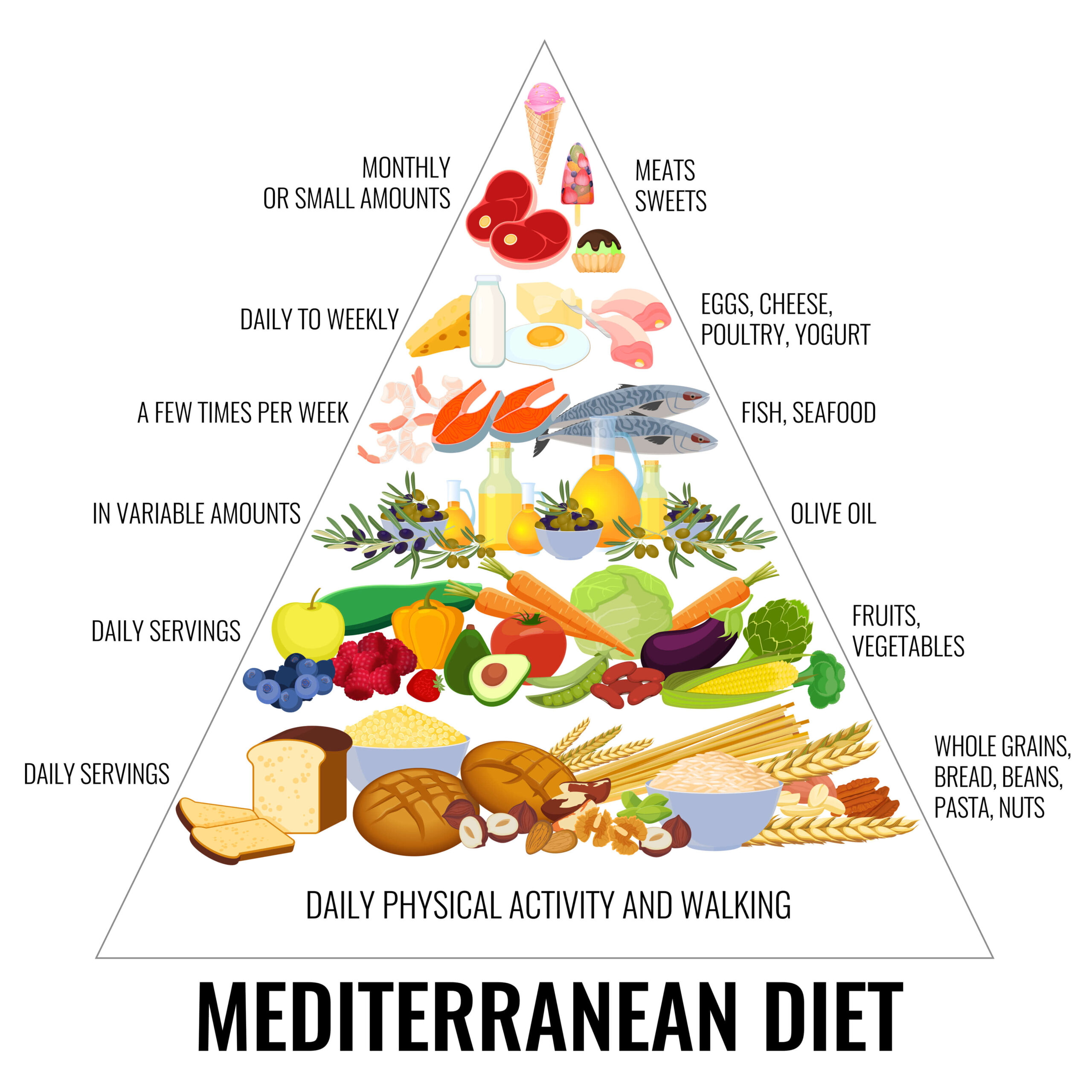The Mediterranean diet is anything but a new popular diet trend. In fact, the month of May was officially designated International Mediterranean Diet Month back in 2008! What better time to explore this very popular diet and everything you need to know in order to decide if it’s right for you?

The Mediterranean Diet Defined
Much like the nascent Nordic diet, the premise of the Mediterranean Diet is borrowing the eating habits of a particular region based off local, fresh ingredients and cooking methods. The countries include those that border the Mediterranean Sea—France, Italy, Spain, and Greece. The diet is rich in plant-based foods and focuses on fish and seafood as the main animal products. It is extremely similar to the Nordic diet in both the composition as well as health benefits, though the Nordic diet has not been studied as extensively. The biggest difference lies in the fats used. Olive oil is the star in Mediterranean countries whereas olives are not common in Nordic countries, hence the somewhat controversial use of rapeseed (canola oil).
The Mediterranean diet often ranks No. 1 among U.S. News’ Best Diets Overall, and topped the list this year. Let’s unpack this beloved way of eating, its pros and cons, and how it compares to the Primal lifestyle.
What to Eat on the Mediterranean Diet
At the base of the Mediterranean food pyramid is an abundance of fruits, vegetables, olive oil, grains, legumes, potatoes, nuts, and seeds. Fish and seafood make up the next level, with poultry, eggs, dairy and red wine sitting above that at a moderate intake. The very top consists of meats and sweets.

Foods to Enjoy With Every Meal
- Fruits
- Vegetables—especially leafy greens
- Grains (mostly whole)—such as brown rice, millet, farro, barley, buckwheat
- Olives
- Olive oil
- Beans
- Nuts
- Legumes
- Seeds
- Herbs
- Spices
Foods to Enjoy at Least Two Times Per Week
- Fish (including those rich in omega-3 fatty acids)—such as tuna, herring, salmon, and sardines
- Seafood—such as mussels, oysters, and clams
Foods to Enjoy Moderately
- Poultry—chicken, duck, turkey
- Eggs
- Cheese
- Yogurt—plain, unsweetened, and Greek yogurt
- Wine
Foods to Enjoy Sparingly
- Red meat
- Pork
- Lamb
- Sweets
- Butter
- Sugar and sweetened beverages
- Processed and packaged foods
- Food additives
- Refined fast foods
- Refined, processed, or hydrogenated oils
Foods to Avoid
- There are no absolute NOs
Pros of the Mediterranean Diet
1. Heart Health
A recent study showed conforming to the Mediterranean diet has been linked to better outcomes with cardiovascular health, including a reduction in rates of coronary heart disease, ischemic stroke, and total cardiovascular disease. A 2021 study concluded that compared to a low-fat diet, a Mediterranean diet is associated with a decreased progression of plaque buildup in the arteries. A Mediterranean diet has also been linked to reducing blood pressure.
2. Flexibility
Because the diet is very inclusive of all food groups, it is easily adjustable to meet specific dietary requirements such vegetarian, vegan, gluten-free, kosher, etc.
3. Brain Health
A 2021 study found consistent compliance with the Mediterranean diet was associated with improved memory and a decrease in risk factors associated with Alzheimer’s disease. A systematic review conducted in 2017 showed a correlation between following the diet and improved cognitive function, specifically in memory and executive function in older adults.
4. Gut Health and Aging
A study conducted in 2020 found the Mediterranean diet increased the gut microbiome of older adults. Participants adhering to the diet for over 12 months showed markers of lower frailty and increased cognitive function associated with gut microbiome alterations. These findings show that the Mediterranean diet improves gut health and has the potential to promote healthier aging.
Cons of the Mediterranean Diet
1. Time-Consuming
It’s next-to-impossible to know for certain what cooking fats are being used when you eat at restaurants or when you purchase pre-made meals. Carving out time into your hectic schedule to prepare your meals in olive oil, rather than refined vegetable oils, at home can become time-consuming.
2. Alcohol
Small amounts of wine (up to a glass per day for women and two for men) is encouraged on the Mediterranean diet. While health benefits have been linked to the consumption of a moderate amount of alcohol, adverse effects have also been noted—such as an increase in certain cancers. It is always best to consult with your physician, regarding alcohol intake, as its consumption should be avoided by some vulnerable populations.
3. No Nos
While the broad scope and wide range of food accepted on the diet allows for much flexibility and possibly a greater ease of compliance, it is important to watch portions and ensure you are getting a healthy combination of the foods for optimal health benefits and weight loss, if that is a goal or need. The key word is moderation when it comes to sweets and treats on this diet!
The Mediterranean Diet Compared to Primal Living
Similarities
Much like Primal living, the Mediterranean diet is more than just a diet; it’s a lifestyle, with both “diets” emphasizing active living and sharing meals with loved ones. Both eating styles also emphasize the consumption of real, whole foods and limit processed foods, refined vegetable oils, and sugar. Neither emphasizes low-fat.
Differences
Mediterranean diet meals are built around vegetables, whole grains, and legumes and limit most animal protein except fish and seafood. While the Primal Blueprint includes an abundance of vegetables, whole grains and legumes are not included in the list of Primal foods to consume and there is no limit on the amount of animal protein. One very important aspect of Primal living is the emphasis on quality of food. High-quality foods such as wild fish, grass-fed meat, and pastured eggs are a mainstay, while the Mediterranean diet places little to no importance on sourcing of ingredients apart from the region. The Mediterranean diet also includes dairy whereas the Primal Blueprint places dairy in an area of limbo and prioritizes full-fat and raw varieties.
Summary
There are many healthy aspects to the Mediterranean diet and years of studies to corroborate its benefits. However, it differs from Primal living in several important areas that are the backbone of the Primal Blueprint. For those adhering to a plant-based lifestyle, it is a healthy option to follow. Low-carb or ketogenic Mediterranean is a hybrid approach that is gaining traction and just may offer the best of both worlds. Studies have shown an improvement in fatty liver, metabolic syndrome, and weight loss with this modified Mediterranean approach.

